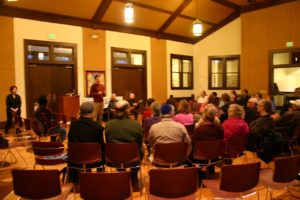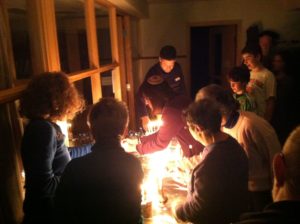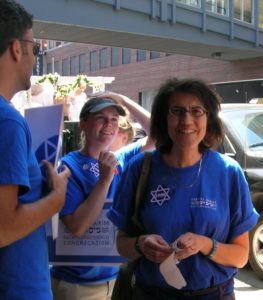Have you ever watched a kid open up a present and exclaim, “It’s exactly what I wanted! What is it?” That’s what I notice when people discover Reconstructionist Judaism. They come to services and have a feeling that it’s what they’ve always longed for, but they are not sure how to describe it and are not absolutely sure what it is. It just fits!
Reconstructionism is the first major stream of Judaism to be founded in the United States. It grew as a response to the challenge of modern life in America; that is, how to effectively live in two civilizations, Jewish and secular democratic. The movement is based on the writings of Rabbi Mordecai Kaplan. He defined Judaism as “the evolving religious civilization of the Jewish people.” This perspective acknowledges that Judaism has changed over time to meet the challenges of each era, while also maintaining the  principles of our tradition. We strive to take the highest values from each civilization. Kaplan taught that each generation must figure out how to practice our tradition and live a Jewish life in the present. This puts innovation at the heart of Reconstructionism. We respect our heritage and actively work to adapt it in ways that are meaningful for modern times. You often hear that “the past has a vote but not a veto” in Reconstructionist circles.
principles of our tradition. We strive to take the highest values from each civilization. Kaplan taught that each generation must figure out how to practice our tradition and live a Jewish life in the present. This puts innovation at the heart of Reconstructionism. We respect our heritage and actively work to adapt it in ways that are meaningful for modern times. You often hear that “the past has a vote but not a veto” in Reconstructionist circles.
 Kaplan also defined Judaism as more than a religion; he highlights that we Jews share peoplehood, a language, a traditional homeland, culture and the arts. Consistent with that belief, Kaplan took a leadership role in the founding of another important American Jewish institution, the Jewish Community Centers.
Kaplan also defined Judaism as more than a religion; he highlights that we Jews share peoplehood, a language, a traditional homeland, culture and the arts. Consistent with that belief, Kaplan took a leadership role in the founding of another important American Jewish institution, the Jewish Community Centers.
Some of the innovations Reconstructionism has introduced in American Judaism include: the first public celebration of a Bat Mitzvah over ninety years ago (Kaplan’s daughter Judith), the first rabbinical school to open its doors to GLBT students (and the first rabbinical school to ordain women from its inception), and the first movement to come out with a gender neutral prayer book. Reconstructionism approaches Jewish life with a deep respect for tradition as well as insights, ideas, and innovations from contemporary life. Reconstructionist congregations make many of their decisions about guidelines and practices through a democratic process of study, discussion and group decision-making. Reconstructionist communities also typically participate actively in using religious tradition as a positive force for social change.
At Mayim Rabim, I have taught a three-part introduction to Judaism called “Belonging, Believing and Behaving.” Reconstructionists maintain that belonging to the Jewish people comes from believing or behaving. Like the kid opening the present, many people who belong to a Reconstructionist synagogue first discover the beauty of Judaism. Then they can start to unwrap the gifts of beliefs and rituals that accompany the exploration of Jewish life.

How does one describe Mayim Rabim, the Twin Cities’ only Reconstructionist congregation? It’s warm, friendly, spiritual, soulful, informal, intellectual, participatory, questioning, egalitarian, GLBT inclusive, and welcoming of individuals partnered with someone of a different faith. Among our ranks are young families, mature couples, and singles; we have diversity in religious observance, backgrounds, upbringing and Jewish knowledge. Sure, this might describe a number of synagogues in the Twin Cities. Mayim Rabim doesn’t have a monopoly on those qualities, but it does on being Reconstructionist!
We’ve got a gift waiting for you. Come let us help you explore! To learn more about Reconstructionism, visit www.jewishrecon.org or read the works of Rabbi Mordecai Kaplan; and for more about Mayim Rabim, visit us at www.mayimrabim.org.
Rabbi Sharon Stiefel serves as rabbi of Mayim Rabim Congregation. In addition to her position at Mayim Rabim, Rabbi Stiefel is the rabbi/spiritual counselor for Sholom Johnson Hospice.

